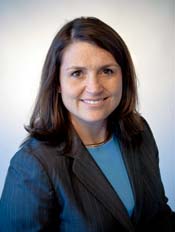 |
 |
| current issue |  | past issues |  | send a letter/news |  | address update |  | advertise |  | about us |  | alumni home |
Features
|
The First UROP Grant Recipients
Where are they now? |
Return to The First UROP Grant Recipients |
Amy Beasley Cronin '89
Major: chemical engineering
Job title: Division manager, National Fire Protection Agency
Hometown: Plympton, Mass.
 Amy Beasley Cronin '89 |
What have you been doing since graduation, and what are you doing now?
Since graduating, I spent 6 years as an Officer with the US Public Health Service with the National Institute for Occupational Health (NIOSH). At NIOSH, I worked on a team to study workplaces where employees were getting sick, and to design controls to create safer workplaces. In order to publicize the research, I authored numerous articles in peer-reviewed journals and made presentations nationally. In addition to my other duties, I served on an advisory committee to the Surgeon General.
In 1996, I moved to Plympton, Mass., for a job with the National Fire Protection Association (NFPA), a nonprofit company who facilitates fire regulations, research, training and education. NFPA invented Sparky the Fire Dog, and publishes the National Electrical Code (NEC) and hundreds of other fire protection codes and standards.
After claiming I'd never, ever, ever take another engineering class (not because I didn't love it, but because it was so intense), I took a single graduate level class with a friend, Margie Wallace, in Cincinnati, and it wasn't as intense as I had remembered. In 1999, I got my master's of engineering management at Western New England University, just before my first daughter, Carly Spencer, was born, followed by Natalie Spencer in 2001. In 2009, I got remarried to Brad Cronin, a firefighter in Newport, R.I., and fire topics instructor.
In 2008, I had the privilege of testifying in front of Congress (U.S. House of Representatives Committee on Education and Labor hearing) about the hazards of dust explosions. I was supporting legislation to help prevent worksite explosions like the one at the Imperial Sugar refinery in Port Wentworth, Ga., in early February that killed 12 workers and critically injured 11 others. Before working at NFPA, I didn't realize how hazardous dusty workplaces could be. That same year, I testified before the Senate subcommittee on Health, Education, Labor and Pensions on the same topic. Also in 2008, I was a finalist to appear on the Martha Stewart show to talk about chemical safety in the home. Although they ended up picking someone else, they did use a few of my ideas, which was encouraging. But that experience gave me the taste for Hollywood (she says tongue in cheek). I see myself as the Sanjay Gupta—what he brought to the public regarding the field of medicine—I'd like to be the face of highly technical engineering/safety topics and bring them to the average non-technical person. So anyone with connections...I'm ready for my close-up!
Your UROP project was entitled "Flow Visualization of a Staged Circulating Fluidized Bed Coal Combustor." Can you tell us what you did, and what you got out of it?
Although I didn't follow a path suggested by my project, the UROP project allowed me to use my academic studies in a practical way. The program also gave me my first opportunities to publicly present my research. Although I was horrible in the beginning at public speaking, I kept practicing and am now comfortable presenting regularly in front of large (and sometimes hostile) audiences. My UNH Chemical Engineering experience was invaluable. At that time, my class had only 12 graduating. Teamwork was crucial in the lab as well as in the classroom. Amazing ChE classmates and fellow alumni I particularly appreciated (they made everything fun) were Patti Newcomb Ascanio ]89, Sara Marelli Dixon '89, Sue Peron Bracken, Ed Fournier, Alex Jarostchuk and Filiz Kinaci Crocker.
What do you remember about being on the cover of the Alumnus (assuming you remember it)?
I remember it was during finals period, and I had to run across campus to take the photo. I got to sit beside my friend Dean LaPierre, who encouraged me to assist him with the project.
Anything else you'd like to add? Any advice for current students?
It's tough to do anything "extra" such as an optional research project while completing tough engineering coursework. The research allows students to apply the knowledge gained in the classroom to a real world project. It shows great initiative when seeking your first job, and will give you the confidence to know you can be successful "in the real world." I thank Dr. Farag and Dr. Barkey, both in the Chemical Engineering department, who both provided me with confidence and inspiration to succeed.
< Previous recipient Next recipient >
Back to the '88 UROP stories
blog comments powered by Disqus

